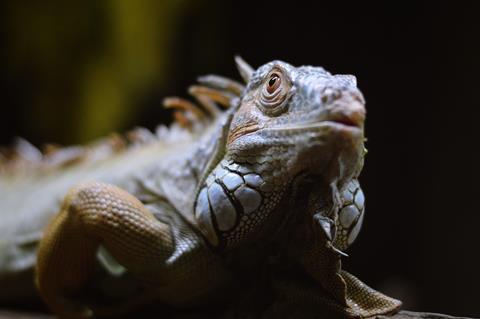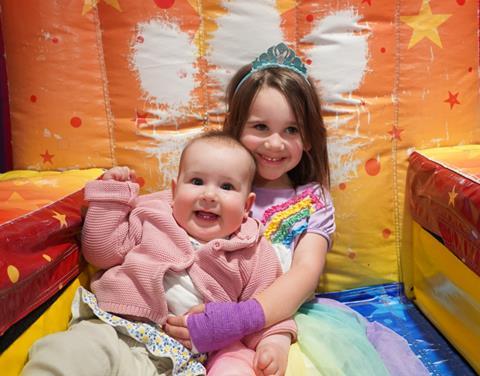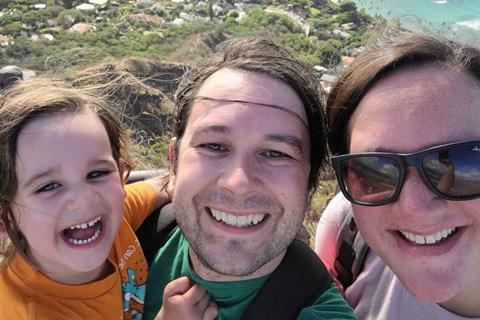A 3-year-old girl was infected with an unusual Mycobacterium marinum infection, that developed following an iguana bite while she was on holiday in Costa Rica, report the doctors who treated her at this year’s European Congress of Clinical Microbiology & Infectious Diseases (ECCMID) in Copenhagen, Denmark (15-18 April).

The authors believe it is the first reported case of M. marinum infection following an iguana bite. M. marinum is a ubiquitous, non-tuberculous mycobacterium that causes a tuberculosis-like illness in fish and has been known to infect humans when skin wounds are exposed to contaminated fresh or salt water.
Iguana bite
The toddler was sitting on the beach eating cake when the iguana suddenly ran up and bit her on the back of her left-hand before snatching the cake.
She was immediately taken to a local clinic and found to have a single, superficial wound on the back of the metacarpal bone of her middle finger. After disinfection, she was given five days of amoxicillin antibiotics for potential salmonella exposure (common after reptile bites), and the wound healed quickly without any issues.
Five months later, however, her parents noted a small bump on the back of her left hand which gradually became larger, and the skin became red and mildly painful over the next 3 months.
The toddler attended hospital at Stanford Children’s Health (Stanford, CA, USA) where an ultrasound revealed a mass consistent with a ganglion cyst (fluid-filled lump), but the location and symptoms were not in keeping with this.
Discharge of pus
The orthopaedic surgeon who removed the 2-cm thick-walled mass noticed a discharge of pus from the wound, indicating an infection.
Histological examination revealed extensive tissue death and necrotizing granulomatous inflammation (an area of inflammation where the tissue has died), and cultures yielded a pure growth of M. marinum. As M. marinum is resistant to common antibiotics including amoxicillin, the girl was started on rifampin and clarithromycin and responded well to therapy.
While organisms that cause infection after dog or cat bites are well known, the microbiological cause of infected wounds secondary to iguana bites is limited to a few case reports, with Serratia marcescens and Staphylococcus aureus most often implicated. Salmonella enterica is also possible, given 75-90% of both wild and captive reptiles (including snakes, turtles, and iguanas) are colonised with these bacteria.
Cold-blooded hosts
Several studies have reported that domestic reptiles harbour non-tuberculous mycobacteria (NTM) given their abundance in fresh and salt water.
“M. marinum prefers lower temperatures (30◦C) for optimal growth, and it’s highly likely that the cold-blooded iguana, with body temperatures ranging from 22-37◦C, may sustain these microbes as reservoirs,” explained lead author Dr Jordan Mah from Stanford University School of Medicine, California, USA.
He continues, “The bite resulted in colonisation by a bacterium rarely found in humans, and demonstrates that iguanas may be carriers of harmful bacteria capable of producing severe infections. This may help inform health care professionals of less commonly known bacterial infections following unusual zoonotic exposures.”
UPDATE:
The parents of the little girl Lena Mars (3), who was bitten by the iguana, have released a photo of her recovering and a short statement.
Lena’s parents are Mr Julian Mars and Mrs Luisa Mars. Also pictured are her baby sister, Anna Mars, who was born in October, 2022, just one month before Lena had surgery (November 2022) on the lump that had been caused by the bite from the iguana. Mr and Mrs Mars are providing the statement to raise awareness about the possibility of these kinds of freak incidents involving reptiles. The family live in San Jose, California, USA.

Speaking about the iguana bite, Mrs Luisa Mars said: “Our daughter, Lena, just celebrated her 4th birthday and is still recovering from the surgery in November. The wound is just closing, and the whole healing process has taken more strength than the bite itself.
”Lena is the bravest child we can imagine, and she is handling the situation pretty well. She definitely remembers the bite and knows that the bacteria came from the iguana. She will probably never forget the experience, but we hope that someday we can all laugh about what happened.”

Topics
- amoxicillin
- Antimicrobial Resistance
- clarithromycin
- Clinical & Diagnostics
- Costa Rica
- iguana
- Infectious Disease
- Jordan Mah
- Julian Mars
- Lena Mars
- Luisa Mars
- Marine Science
- Mycobacterium marinum
- Non-tuberculous mycobacterium
- One Health
- Research News
- rifampin
- Stanford University School of Medicine
- The Americas
- UK & Rest of Europe
- USA & Canada




No comments yet